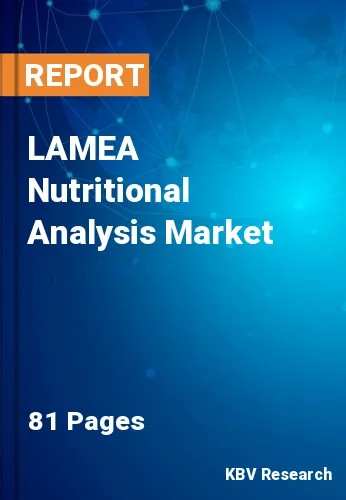
The Latin America, Middle East and Africa Nutritional Analysis Market would witness market growth of 9.9% CAGR during the forecast period (2023-2029).
Health-conscious consumers have been more prevalent recently. It can be attributed to the increased public awareness of the numerous health advantages of eating nutritious foods. Because of this, people are becoming more conscientious and always look for transparency in the food goods they buy and eat daily. Given this customer view, food producers have taken the necessary actions to embrace several essential practices, including nutrition analysis, food testing, and certification.
The procedure serves the objective of nutrition labeling by enabling target customers to see the ingredients used in the food they eat regularly. People are less able to maintain a balanced food pattern due to altering lifestyle patterns and busy schedules, which increases the incidence of malnutrition in the population. In 2020, the World Health Organization estimated that 462 million people were underweight and that 45% of child fatalities were related to malnutrition.
Due to this, governments are making efforts to expand the infrastructure for food testing, which allows for the examination of food's nutrients. In addition, governments have recently increased spending and adopted dietary changes to combat hunger. Simultaneously, civil society groups, donors, and corporations must exert more effort to ensure budgets in several areas, including agriculture, food systems, education, health systems, water sanitation, hygiene, and social protection, as well as to allocate more funds to end all forms of malnutrition. This element fuels consumer desire for nutritional analysis of goods.
Nutritional analysis market demand is rising in the LAMEA region due to the region's rapidly evolving economic conditions and significant rise in food manufacturers. Latin America is still working toward consistent and efficient food regulation, even though several nations have implemented modern, well-considered food laws. But due in part to the unstoppable march of globalization and the anxiety of falling behind, Latin American nations are attempting to harmonize on this. There is a greater push for cooperation, regulation, and implementation in the region, and the regulatory organizations in Latin America want the food regulations to be more aligned and enforced. Hence, the regional market will grow rapidly throughout the forecast period.
The Brazil market dominated the LAMEA Nutritional Analysis Market by Country in 2022, and would continue to be a dominant market till 2029; thereby, achieving a market value of $160.6 Million by 2029. The Argentina market is exhibiting a CAGR of 10.5% during (2023 - 2029). Additionally, The UAE market would display a CAGR of 9.6% during (2023 - 2029).
Based on Analysis Type, the market is segmented into Laboratory Testing and Nutritional Database Testing. Based on Nutrients, the market is segmented into Macronutrients and Micronutrients. Based on Product Type, the market is segmented into Bakery & Confectionery, Dairy, Snacks, Meat Products, and Others. Based on countries, the market is segmented into Brazil, Argentina, UAE, Saudi Arabia, South Africa, Nigeria, and Rest of LAMEA.
Free Valuable Insights: The Worldwide Nutritional Analysis Market is Projected to reach USD 9.2 Billion by 2029, at a CAGR of 7.9%
The market research report covers the analysis of key stake holders of the market. Key companies profiled in the report include SGS S.A., TÜV Nord Group, Eurofins Scientific SE, Intertek Group PLC, Microbac Laboratories, Inc., Compu-Food Analysis, Inc., Pat-Chem Laboratories LLC, ALS Limited, Lifeasible, Inc., and Opal Research And Analytical Services.
By Analysis Type
By Nutrients
By Product Type
By Country
Our team of dedicated experts can provide you with attractive expansion opportunities for your business.
